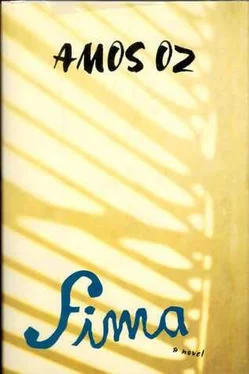Fima returned home and began searching in the wastepaper basket under his desk for the telephone bill he had screwed up and thrown away yesterday or the day before. He did not find the bill, but he did pick out a crumpled page of Ha'arets . He smoothed it out and took it to bed with him, and read about present-day false messiahs until his eyes closed and he fell asleep with the newspaper over his face. At two o'clock the light snow stopped. Jerusalem stood frozen and empty in the dark, as though the catastrophe had happened and all the people had been exiled again.
IN HIS DREAM GAD EITAN ARRIVED IN A MILITARY JEEP WITH A machine gun mounted on the hood, to summon Fima to a meeting with the president. The president's office turned out to be in a small basement synagogue at the edge of the Russian Compound behind the main police station. A foppish British officer sat behind the desk, with a leather belt aslant his black uniform. He urged Fima to sign a voluntary confession to the murder of the dog, who had been transformed in the dream into a woman whose corpse was lying, wrapped in a sheet soiled with black blood, at the foot of the Holy Ark. Fima requested permission to see the dead woman's face. The interrogator replied with a smile, What for? Isn't it a pity to wake her? It's Chili again; she risked her life for you, she brought you over to the Aryan side, she saved your life repeatedly, and you betrayed her. When Fima plucked up the courage to ask what punishment was in store for him, the defense minister said, Look what a dummy you arc. The crime is the punishment.
27. FIMA REFUSES TO GIVE IN
AT HALF PAST SIX IN THE MORNING HE WOKE WITH A START BECAUSE a heavy object fell in the flat above, followed by a woman shouting, not for long or particularly loudly, but terribly, desperately, as though she had seen her own death. Fima leaped out of bed and into his trousers, then hurried to the kitchen balcony to hear better. No sound came from the upstairs flat. Only an invisible bird, which kept repeating three gentle syllables, as if it had come to the conclusion that Fima was so slow on the uptake that he would surely not understand. Shouldn't he go upstairs quickly to find out what had happened? To offer help? Rescue? To call the police or an ambulance? But he remembered that his telephone had been cut off, so he was relieved of the obligation to intervene. Besides which, it was possible that the crash and the scream had happened in his sleep, and his inquiry would cause nothing but embarrassment and derision.
Instead of going back to bed, he continued standing on the kitchen balcony in his long-sleeved undershirt, amid the vestiges of cages, jars, and boxes where he and Dimi had once kept their bottle of worms. Now these exuded the rank smell of decay, of wet sawdust mixed with blackened droppings and remains of rotting food: carrots and cucumber peel and cabbage leaves and lettuce. At the beginning of the winter Dimi had decided to free the tortoises, insects, and snails they had collected in the wadi.
And where was the snow of last night?
It was as if it had never been.
It had gone without a trace.
The barren hills to the south of Jerusalem stood purged, flooded in blue radiance, so that it was almost possible to make out silvery flashes on the underside of the leaves of distant olive trees along the ridge of Beit Jalla. It was a cold, sharp light, crystal clear, sent to us perhaps as an advance against the distant days when suffering would end, when Jerusalem would be freed from its torments, and the people who took our place would live their lives calmly, considerately, rationally, and with good taste: then the light of the sky would be like this forever.
It was bitter cold, but Fima, in his yellowing winter undershirt, did not feel it. He stood leaning on the railing, filling his lungs with the winelike air, marveling at the fact of suffering in the midst of such beauty. A minor miracle had occurred below him in the back yard. An eccentric, impatient almond tree had decided suddenly to flower, as though it had got its calendar mixed up. It was covered with tiny glowworms that had forgotten to switch themselves off at the arrival of dawn. Myriad raindrops sparkled on the pink blossoms. The glittering almond tree reminded Fima of a slim, pretty woman who has cried all night and not wiped away her tears. This image caused him childlike joy, and love, and a longing for Yael, for all women indiscriminately, with the bold resolution to open a new chapter in his life, starting this morning: to be from now on a rational, straightforward man, a good man, freed from falsehood and all pretense. So he put on a clean shirt and Yael's sweater. With a boldness that surprised him he climbed the stairs and firmly pressed the upstairs neighbors' bell. After a few moments Mrs. Pizanti opened the door in a dressing gown half unbuttoned over her nightdress. Her wide, childlike face struck Fima as distorted, or even beaten. But perhaps that was more or less what anyone waked from sleep looked like. Behind her, in the pale neon light of the entrance hall, her husband's eyes were glittering. He was a hirsute, athletic-looking individual, much taller than his wife. She asked anxiously if something had happened. Fima said:
"Sorry. Nothing. I thought maybe something fell down in your flat? Or broke? I just thought, I imagined, I heard… something like that? I must have been mistaken. Perhaps it was just an explosion a long way off. Perhaps the Messianic Faithful dynamited the Temple Mount and turned it into a Vale of Tears."
"Sorry?" said Mrs. Pizanti, staring at Fima with bewilderment and some apprehension.
Her husband, an x-ray technician, replied from behind her back in a tone that struck Fima as not entirely honest:
"Everything's a hundred percent in here, Dr. Nisan. When you ring the bell, I think maybe you have some problem. No? You are short something? Out of coffee again? Blown a fuse? I come and change it for you?"
"Thank you," Fima said, "that's very kind of you. I've got plenty of coffee and the electricity is working fine. It so happens my telephone is out of order, but I'm quite pleased, actually; it means I can have some peace and quiet at last. Sorry to bother you so early in the morning. I just thought… Never mind. Sorry. Thank you."
"No problem," said Pizanti expansively. "We always get up at sixfifteen anyway. If you need to make phone call, just feel free. On the house. If you like, I come down and check your contacts. Maybe something come loose."
"I was thinking," Fima said, appalled at the words he heard coming out of his own mouth, "of calling a lady friend of mine who may have been waiting for me since last night. Two lady friends, actually. But right now I think it wouldn't be such a bad thing to let them wait. It's not urgent. I'm sorry I disturbed you."
As he was on the point of leaving, Mrs. Pizanti said hesitantly:
"It could be something fell down outside from the wind. Some washtub or something. But with us everything is fine."
These words convinced Fima that he was being lied to. But he forgave his neighbors, because he had no reason to expect them to tell him about the fight they must have been having, and also because he himself had not told the truth about calling his girlfriends. When he was back in his flat, he said:
"What a fool you are."
But he forgave himself too, because he had meant well.
He did his exercises in front of the mirror for ten minutes or so, shaved, dressed, combed his hair vaguely, boiled some water in the new electric kettle, made his bed, and for once managed all these activities without mishap. He hit her, he thought, he may even have banged her head against the wall; he might have killed her; who knows, he might well do it one of these days, perhaps this very morning. What Hitler did to us didn't finish in 1945; it still goes on, it seems it always will. Dark things go on behind every door. Acts of cruelty and desperation. Underneath this whole state, hidden insanity is simmering. Three times a week our long arm catches the murderers in their dens. We can't get to sleep before we have inflicted a little pogrom on the Cossacks. Every morning we kidnap Eichmann and every evening we nip Hitler in the bud. In basketball we defeat Chmielnicki and in Eurovision we avenge Kishinev. But what right do I have to interfere? I'd be happy to gallop up on a white charger and rescue that Pizanti woman, or the pair of them, or the whole state, if only I knew how. If only I had some idea where to start. There's Baruch with his Trotsky goatee and his carved walking stick; he does his bit to put the world straight by handing out donations and grants, whereas all I ever do is sign petitions. Maybe I should have persuaded that policeman last night to let me in to see Shamir? For a heart-to-heart chat. Or introduced Shamir to my taxi driver?
Читать дальше












